"It was like a miracle" : Lancashire vet who was paralysed with Guillain-Barré syndrome pays birthday tribute to Sue Ryder centre in Fulwood
and live on Freeview channel 276
This week Virginia paid tribute to the recuperative care she has received at the Sue Ryder Neurological Care Centre in Fulwood.
The pioneering centre celebrates its second birthday this month and yesterday Virginia travelled from her home at Burrow, near Lancaster, to join the anniversary celebrations.
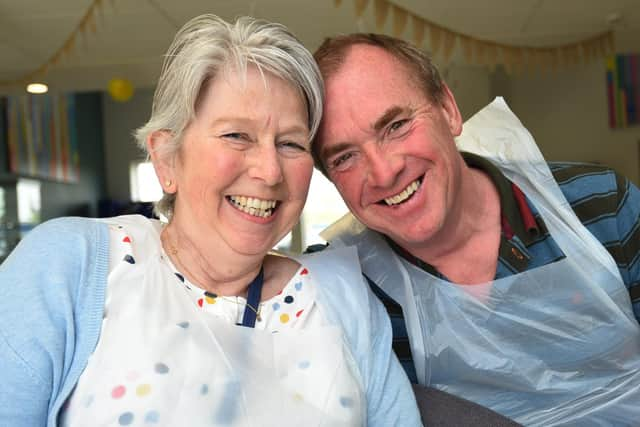

Advertisement
Hide AdAdvertisement
Hide AdVirginia said:“What I’ve found out is I really won the postcode lottery getting here. There isn’t anywhere else, it’s the only purpose built (treatment centre) in the country.”
In contrast she fears many G-B sufferers end up in care homes and do not progress as well as she has because of a nationwide lack of appropriate specialist therapy. She said : “The physio is just amazing – you have to have physio if your muscles have wasted to nothing and your nerve supply doesn’t work! There were bits of equipment to help me stand and help me walk and to help me move my legs and arms. It was intensive. You would end up exhausted (but) it was just so worthwhile.”
The 61 year old developed Guillain-Barré syndrome (G-B syndrome), a disorder where the body's immune system goes into overdrive and damages nerves.Virginia believes it was a very rare response to her first Covid vaccination last March which led to her battle with Guillain-Barré syndrome. She said: “ I’m all for vaccinations and even after what happened to me I’ve had two (different Covid) vaccinations since...the Covid vaccine has saved millions of lives. It’s really rare.”
She said: “I started feeling quite poorly after two weeks. It took about three or four weeks for me to be completely paralysed.”
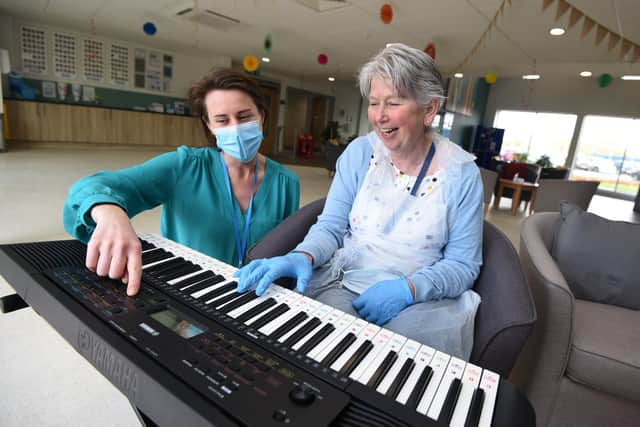

Advertisement
Hide AdAdvertisement
Hide AdAs a vet she had a good inkling of what was wrong with her. She said: “I knew when I started with the symptoms it was almost certainly what I’d got and I went to casualty with it.”
Her condition worsened and after a second visit to casualty two days later she was admitted. She said: “The first time I could walk, the second time I went in in a wheelchair.”
She was later transferred to the Royal Preston Hospital but Virginia has only the haziest of memories of the months which followed. She was in hoispital for six months and said: “I think they gave me so much medication that a lot of the time I was in a dream like state. I really can’t remember much of the first five to six weeks. I just rmmeber waking up periodically and thinking ‘oh dear it’s not a dream.’ ”
Virginia said she recognised death “was a possibility, but I hoped I wasn’t going to (die)”.
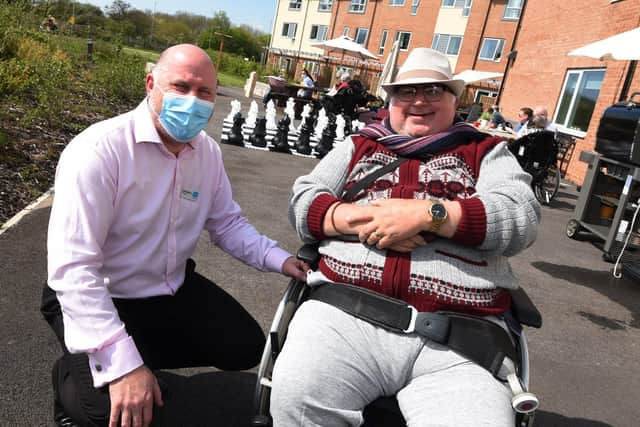

Advertisement
Hide AdAdvertisement
Hide AdShe said: “It started off in my fingers and toes and it crept towards the rest of my body. I had a horrid loss of sensation in the mouth and my tongue was paralysed and one side of my face. I couldn’t eat, so I had a feeding tube. I couldn’t talk at the beginning."
In Royal Preston she could hardly move. Previously a keen cyclist who had run marathons for charity she was shocked by her extensive weight and muscle loss when she finally saw herself in a mirror.
She said: “I couldn’t do anything when I came out of Preston hospital.I couldn’t even stand up on my own. I’d not got the use of my legs and arms and I couldn’t pick up a pen ... I felt depressed, very depressed. I couldn’t see where the future was going. It was just hideous.”
Her transfer to the Sue Ryder Neurological Centre in Fulwood in mid-September marked a turning point. Virginia says the time was right as she was ”ready to start getting better”, but the crucial factor was the personal care, support, expertise and enthusiasm provided by staff.
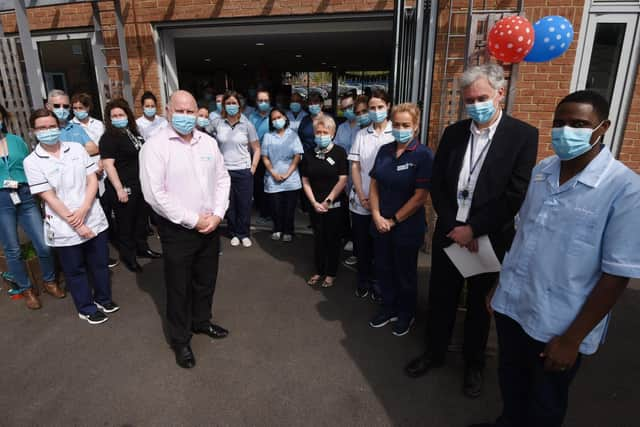

Advertisement
Hide AdAdvertisement
Hide AdShe said: "The whole place is so inspirational ... I spent three hours in therapy every day. Within two weeks they had got me able to stand on my own. Then they set out what goals we’d to achieve in the next few weeks. I remember they said they would have me walking on a zimmer frame within four weeks. “
She recalls being taken to the gym and suddenly finding herself able to move her feet forwards and backwards with the support of parallel bars for her body. She said: “I walked along… It was like a miracle.”
She said: “When I got on my zimmer frame I could move in my room a bit. My husband said you’ll not be able to use it outside (at home) it’s all grass and gravel – why not crutches?”
A week later, despite her own doubts, she was managing crutches: “It was just miraculous. From what I know about GB syndrome your nerves do eventually repair...but you really need the physical therapy to get you going. It’s because your immune system, destroys the coating on your nerves like someone taking all the white off electric wiring, they just short all the time.”
Advertisement
Hide AdAdvertisement
Hide AdVirginia works part time at Lanes Vets in Lancaster and the practice also has a base in Garstang.Now Lanes vets has made the care centre its Charity Partner of the Year 2022.
As a vet used to doing surgery the loss of manual dexterity was a particular blow. Virginia also played the piano at home. The music therapist at the Sue Ryder centre came to the rescue, asking Virginia if she had ever played an instrument: "She brought me a little keyboard and said play a scale, because I’d done scales often my hands did it. She said get some music from home and next time play me a tune..”
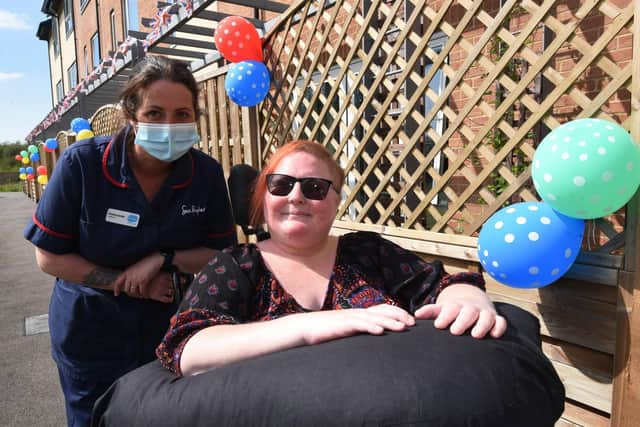

Watching her play it became clear was needed next and further exercisewere advised. She said: "Three weeks later I could write out what I wanted on the menu. I could play a tune.”
Music had also helped her start walking. She was asked to choose a familiar tune to walk to: ”They said it would get my muscles to remember what I used to do and it really worked.”
Advertisement
Hide AdAdvertisement
Hide AdShe was discharged from the Teal Avenue centre on December 8 last year and her recovery continues. She recalled:”I walked out, but not very far – 10 yards or something like that, but the feeling was just amazing.”
She now does 90 minutes of exercises daily and sees a physio at the Westmorland General hospital once a month.
The nerve supply has not fully returned to her feet yet but she said: “I have been on a bicycle for a short distance. I have climbed a tiny hill.”
She used to work three days a week and has returned for a three hour session once a week – a triumph, but very tiring.
Advertisement
Hide AdAdvertisement
Hide AdReflecting on the last year Virginia said: "You really realise what you used to take for granted - things like standing in the shower and washing yourself.”
The other thing she has savoured is being outdoors and feeling the elements: “Being outside and standing outside when it rains and feeling rain and wind and sun! I don’t think I’ll ever do running again, but never say never.”
She knows her husband retired farmer James and daughter Philippa, a revenue manager, must have had difficult times too since her diagnosis, especially as they were unable to visit her in hospital due to Covid restrictions. Next year Philippa is getting married and Virginia said: “My husband said if you get up and walk again you can walk her down the aisle instead of me. I’ve told him I wouldn’t deprive him of that It will be lovely just to be able to be there.”